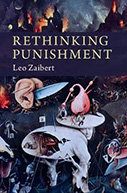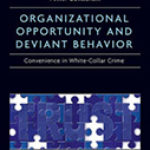Rethinking Punishment

Author: Leo Zaibert
Publisher: Cambridge, UK; New York: Cambridge University Press, 2018. 265p.
Reviewer: Youngjae Lee | July 2019
Leo Zaibert’s Rethinking Punishment defends the following propositions:
- There is an “essential conceptual connection between punishment and suffering” in that punishments “necessarily have to (seek to) make the wrongdoer suffer” (pp. 3 & 7).
- The correct way to understand retributivism is as the view that “there is value in deserved suffering itself” (p. 14). (Zaibert calls this view “axiological retributivism.”)
- There is value in deserved suffering itself because “desert gives a certain order – a certain meaning – to the whole in which it appears, and this in turn generates intrinsic . . . value” (p. 43).
- The view that “deserved suffering has value” is not the same as the view that deserved suffering should be inflicted (p. 14). (Zaibert calls the view that deserved suffering should be inflicted “deontic retributivism.”)
- There is value in forgiveness, defined as “sparing (deserved) suffering” (p. 3).
- There is a conflict in values between punishment and forgiveness as “one cannot realize the value of just punishment without thereby failing to realize the value of forgiveness (and vice versa)” (p. 23). It follows that there are times when deserved suffering should be inflicted, and there are times when it should not be.
- “Pluralistic axiology,” which recognizes that many things are valuable and those valuable things are not reducible to only one thing (such as pleasure) (pp. 34-35), offers a superior theoretical framework for thinking about punishment (and forgiveness) (p. 19).
Rethinking Punishment has many virtues and defends its key propositions with admirable clarity, insight, and erudition. The book is more than just another book about punishment theory, though, and its distinctiveness has much to do with Zaibert’s breadth of knowledge and interest. The book is rich with examples from historical (Heinrich Himmler, Adolf Eichmann, and Otto Ohlendorft) and literary (Huckleberry Finn, Hamlet, Antigone, Billy Budd, Macbeth) contexts. In addition, as Zaibert notes, the book “connect[s] the discussion of punishment to the discussion of authors not typically registering on contemporary punishment theorists’ radars” (p. 11). Here is a partial list of such topics and authors:
- On “theodicy” (as in suffering and its relationship to “the problem of meaningful existence” (p. 9)): G.W. Leibniz and Max Weber.
- On “ideal utilitarianism” (defined as the kind of utilitarianism that is “pluralistic and non-hedonistic” and to be contrasted against “hedonistic utilitarianism” or the “classical utilitarianism” of Jeremy Bentham) (p. 34) and “organic wholes” (where the value of a whole can be more — or less — than the sum of its parts) (p. 41): G.E. Moore, Franz Brentano, Fred Feldman, W.D. Ross, and Jonathan Dancy.
- On the goal of avoiding suffering: Isaiah Berlin, Bertrand Russell, and Jon Elster.
- On the moralities of Huckleberry Finn and Heinrich Himmler: Jonathan Bennett.
- On the distinction between punishment and revenge: Robert Nozick.
- On Adolf Eichmann: Hannah Arendt.
- On different styles of moral philosophizing, emphasizing either “moral luck” or “moral mathematics”: Bernard Williams and Derek Parfit.
- On forgiveness: Martha Nussbaum, Claudia Card, and Jacques Derrida.
- On dirty hands: Jean-Paul Sartre, George Eliot, Alexander Pushkin.
The book proceeds in the following way. Chapters 1 and 2 give an overview of the book and discuss the central themes as listed above. In the rest of the book, the author elaborates on those propositions, chiefly by engaging with positions held and defended by others. Chapter 3 defends the proposition that there is value in deserved suffering against contrary views and arguments by Thomas Scanlon and Victor Tadros. Chapter 4 defends axiological retributivism against the deontic retributivism of Immanuel Kant and Michael Moore. Chapter 5 considers the communicative approach to punishment through a discussion of works by R.A. Duff and John Tasioulas and, while noting the considerable attraction of both views, explains their deficiencies, along dimensions of recognizing the relationship between punishment and suffering and handling the tension between punishment and forgiveness. Chapters 6, 7, and 8 offer a further elaboration of axiological pluralism through discussions of, among others, John Tasioulas, Derek Parfit, Bernard Williams, H.L.A. Hart, Martha Nussbaum, Jacques Derrida, and Herman Melville’s Billy Budd. Finally, the Appendix returns to the question of value in suffering by focusing on Derek Parfit’s arguments against desert.
I have little to say in the way of substantive criticism, as I am generally sympathetic to Zaibert’s positions and appreciate his sustained attempt to spell out the implications of a distinctive moral philosophical outlook for punishment theory, where the outlook is reminiscent of that of Bernard Williams and Martha Nussbaum. To be clear, Zaibert is fiercely critical of Nussbaum’s recent work on anger and forgiveness, but the passage below in which Zaibert summarizes where he agrees and disagrees with Nussbaum is highly illustrative of the general approach and thrust of this book:
Martha Nussbaum’s championing of forgiveness fails for a variety of reasons. . . . [S]he is . . . mistaken in thinking that the solution to the problems she sees in retributivism is to be found in her latter-day embrace of utilitarianism. There really is very little axiology in Nussbaum’s recent writings, but to the extent that there is any, it is of an overwhelming utilitarian flavor. This is an odd and regrettable turn of events for the author of as non-utilitarian and profound a book as The Fragility of Goodness – a book to a large extent devoted to exploring precisely some of those problems that utilitarianism cannot even countenance (p. 209).
. . . .
As a result of these mistakes, Nussbaum’s current position turns out to be as simpleminded as those doctrines she used to criticize. Before her utilitarian turn, Nussbaum was importantly right that a good judge (either in a courtroom or elsewhere) should reject oversimplified and reductive maneuvers and should instead be “above all committed to an empathetic scrutiny of the ‘insides’ of the individual life [of the wrongdoer]” (p. 209).
. . . .
Given both Nussbaum’s recent shift and the many shortcomings of classical utilitarianism, I will ignore her recent utilitarian/welfarist turn and pay attention instead to her early preoccupation with developing an empathetic scrutiny of the insides of wrongdoers’ lives. This empathy is greatly benefited if we cultivate a “literary” or “narrative” imagination. This process of cultivation ought eventually to produce a form of judicial reasoning “modeled on the reasoning of the concerned reader of a novel.” I agree with Nussbaum (p. 210).
. . . .
Freed from the implausible (and unnecessary) supposition that literary and narrative imaginations invariably recommend forgiveness (or mercy) rather than punishment – Nussbaum’s point is importantly right. This narrative or literary form of thinking can capture much more of reality, and of reality’s complexity, than other forms of thinking; and it can, too, help us avoid a mechanical bureaucratization of the distribution of suffering. This is not because concerned readers of novels are necessarily very deep and nuanced people, but because novels tend to represent life with great complexity. Reading novels is, then, likely to nurture a certain engagement with this complex reality. Virtually any novel would do this better than trolley problems, since these are after all constructed with the specific aim of invisibilizing (even if only transitorily) the complexity of real human lives and real human choices. We need this type of thinking in moral philosophy generally but particularly acutely in punishment theory (p. 239).
Now, a question a reader might ask after all this is what it has to do with our criminal justice system. The author has two answers. His first answer is that his primary interest lies in what he calls the “theoretical” question of punishment, as opposed to the “practical” question of punishment (pp. 1-2). And by “practical” questions, Zaibert is referring to the various contemporary issues arising from the state’s use of its power to criminalize and punish, such as overcriminalization and over-punishment. His first answer thus is that this book is not about state punishment. His second answer, however, is that “the examination of the theoretical problems surrounding punishment may in fact help us better understand – and eventually even help us resolve – some of those practical problems that have hitherto monopolized attention” (pp. 1-2). Nonetheless, such “practical” problems are secondary for Zaibert, as his primary interest lies in the “theoretical” problem. This is a bit disappointing, as Zaibert does not make clear how much gap there may be between his theoretical account and the current realities.
There are places, though, where Zaibert comes close to broaching the topic of what his theory implies about what he calls the “practical” questions. For instance, he remarks at one point that “[n]o punisher, no matter how just, is ever fully morally innocent” as “[a] punisher is in the business of making people suffer, and this business, even when the suffering is deserved . . . simply cannot be done without . . . dirtying one’s hands” (p. 231). Put that way, it still sounds like a purely theoretical proposition. However, shortly after that, Zaibert adds, that “[i]n light of its dysfunctionality, the contemporary criminal justice system in the United States offers . . . depressingly many occasions for serious taint” (p. 237). The idea then seems to be that the value of punishment and the value of forgiveness can change depending on the overall health of the criminal justice system, and how “dirty” a polity’s – and by implication all our – hands are would vary in a similar way. This is of obvious practical significance, and I wish he had done more to develop this sort of analysis in this book.
But that is a minor complaint. In the end, Zaibert remarks, “I would be satisfied if I have succeeded in making any of my theoretical points compellingly” (p. 242). And, on that point, he can rest easy, as the answer to whether he has done so is a resounding yes.
Youngjae Lee, Professor of Law, Fordham University School of Law


